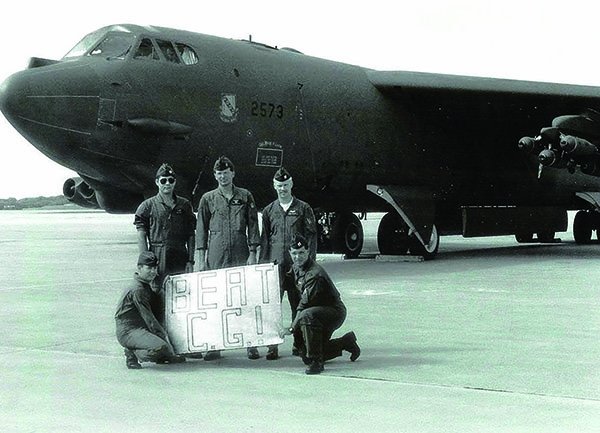Flying Blind: From B-52s to the Classroom
An aviator and educator navigates life after service as his eyesight deteriorates, paying it forward through his work with the next generation.
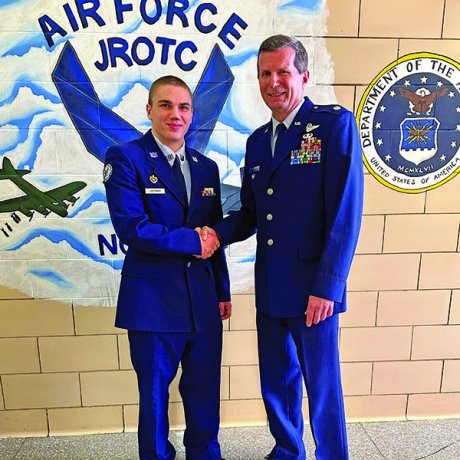
“I was commissioned into the Air Force, and having gone through Air Force ROTC at Norwich, I learned my eyes were not good enough to be a pilot,” says Lt Col Brian O’Connell ’76, USAF (Ret). “Back in those days you had to have 20/20 uncorrected vision to go to undergraduate pilot training. So, I became a navigator and went and flew as a B-52 Stratofortress crew member and electronic warfare officer.”
O’Connell would spend the next 26 years manning a variety of roles. “I was an academic instructor, flight instructor, had staff tours, and was squadron commander at one point,” he says. “It was a varied career that required a lot of travel. We lived in a lot of places.”
He credits his wife, Sue, Class of 1977, for putting up with the job requirements. “I dragged my wonderful wife around with me to these places, and she was a trooper the whole time. I think she enjoyed the travel as much as I did back in those days.”
After a long, busy career, O’Connell decided to retire from the Air Force in 1998. “You’re encouraged to have a retirement physical so that if anything pops up you can get into the VA system,” he says. “During mine, I was diagnosed with glaucoma.”
While he knew his vision had never been perfect, learning he had glaucoma was a shock; though, he quickly learned that the disease would not immediately impact his day-to-day life. “It didn’t affect me in a meaningful or practical way at that point,” he says. “It wasn’t too visible, so to speak.” O’Connell’s life continued — more or less — as normal, working in the defense industry as a civilian. “It didn’t bother me on an emotional level. I had some medications and eye drops, so it didn’t really affect me. It was just in my subconscious.”
His sense of normalcy was shattered just a few years later in 2001 during the Sept. 11 terrorist attacks. “The Air Force asked aviators to come back. I was recalled — voluntarily — and came back in,” he says. “The glaucoma still wasn’t an issue then. It was a long time of progressive decrease in my eyesight from when I was diagnosed.”
O’Connell served until 2006 when he decided it was time to retire again. “I did some defense work again down in Florida until we lost our contract with the Air Force.”
This turn of events prompted O’Connell to begin a new adventure. “I thought about finding something more stable and enjoyable and decided I would like to teach.” Though, he had no idea what that might look like until JROTC floated to mind. “My high school didn’t have it, and none of my contemporaries did it,” he says. “I was only aware it existed.”
He visited the Air Force JROTC website to learn the requirements and where there might be openings. “I found that there are openings in positions around the country. Sue and I began talking about where to go, and I called a local high school near Elgin Air Force Base because all the high schools around there have Air Force JROTC programs.” Upon receiving positive feedback, O’Connell began seeking positions in North Carolina.
“I applied to three schools and was planning interviews,” says O’Connell. “The first I visited was in little Dobson, North Carolina, and they pretty much hired me that day. I talked to the NCO who I eventually ended up working with, and we hit it off. I started right there. It was almost by accident but worked out really well.”
Eight years at Surry Central High School flew by until O’Connell decided to retire for a third time in 2016. His eyesight had begun to deteriorate rapidly. “I got to the point where I thought I wouldn’t be able to continue anymore, so I finished at the same school, in the same program, in the same classroom, with the same NCO.”
O’Connell knew things would change. “Giving up your driver’s license, for instance, is a huge move. We think of older people doing that, like a grandad had to give up his driver’s license at 83. That happened to me in my early sixties and was not in my game plan.”
“I didn’t know anybody who was visually impaired, or even legally blind. I had no one I could connect with or talk to and get advice from.”
“I had to wrap my head around that,” he says. “After I retired from teaching, I was in a place where I was coming to grips with this. That’s a challenge for those of us who have never had to deal with a disability. I didn’t know anybody who was visually impaired, or even legally blind. I had no one I could connect with or talk to and get advice from.”
Sue would soon find out about the blind rehabilitation services offered by the Department of Veterans Affairs (VA) and the Blind Veterans Association. With these resources, O’Connell was able to find the connections he sought. “I realized that I’m not the only guy out there — there’s a bunch of us,” he says. “Making those connections was huge, and that’s what started me on the process of figuring out what is possible now, what makes sense, and getting out of my funk to move forward.”
One of the most impactful programs he participated in involved temporarily residing in Biloxi, Mississippi. O’Connell was able to work with “incredibly well-qualified” professionals, which were vital considering his vision’s deterioration.
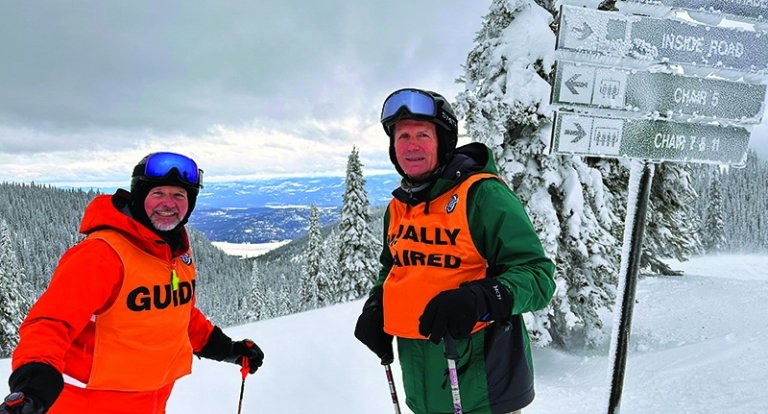
“I got connected with other veterans who have done incredibly impressive things,” says O’Connell. “These guys invited me into adaptive sports programs, which, again, I had no idea even existed.”
“Hiking, climbing, and doing things that I’ve always loved was something that I figured wouldn’t be in my future,” he says. “Meeting these guys and seeing people doing incredible things while I still have some limited eyesight put me back on my feet.”
As O’Connell was settling in to his new reality, the JROTC program at Surry Central was facing a bleak future. The officer who replaced O’Connell following his retirement was leaving the school and they were having trouble finding a replacement. “The Air Force required two instructors to keep the program running at a school. It’s not the active-duty military where you’re given orders to go to a duty station,” he says. “They’re retired individuals who want to be instructors. There was no one applying to come to this little town in rural northwestern North Carolina to take over the position.”
Throughout 2022, O’Connell helped when he could, stopping in as a volunteer when he and Sue were in the area to visit family. However, the program continued to face the reality it may cease to exist.
“The NCO and I kept in contact as friends, and he let me know that the Air Force pulled him aside and told the school unless a senior instructor came in, the program was going to be shut down,” he says. “There were two negatives: one, he would lose his job, but also the program would shut down. I’m biased, but there’s a lot of value to that program.”
“I’ve taught aerodynamics, aviation history, astronomy, and those kinds of things, but there’s so much more that is life-skill focused and mentorship opportunities that would be a huge loss if the program goes down.”
“Long story short, I talked to my wife about returning to the program though I knew it would be hugely different for me if I went back and taught again. I reached out to the school and Air Force and said, ‘Hey, if you don’t mind a blind guy coming back in, I’ll give it a shot.’ That worked out perfectly.”
An added difficulty on top of his visual impairment was the commute. During the time since his third retirement, he and Sue first moved to Florida, and then to Greenville, South Carolina. Luckily, his daughter and her family’s old house was available for purchase.
“Before they moved, we bought their old house,” says O’Connell. “It worked out logistically because it was a place for me to live during the school year, and my daughter and grandson are still around so there are those connections.”
By January of 2023, O’Connell was back in North Carolina and teaching again. Ensuring the program remained alive brought him a great sense of satisfaction. Not only would high schoolers still have the opportunity to participate in JROTC, but his longtime friend and NCO would be able to keep his job. “He really kept the program going and did a great job,” says O’Connell. “The program was on very strong footing.”
While there was a strong sense of familiarity in returning to Surry Central High School, there was also a newfound sense of the unknown. “I had to adjust and adapt to not seeing, and the coolest part about that was the technology — anybody can learn technology, which I have,” he says. “I could work with computers and different tools to allow myself to know and teach the curriculum, that kind of thing. But I don’t see faces and I don’t see a lot of things you’d see in a normal classroom environment.”
“Imagine my slight level of concern walking into a classroom and the kids know that I can’t see their faces and I’m not able to see what they’re doing,” he says. “But the cool thing was that the kids were great, they would help me get everything set up since I use Apple products for their accessibility — because kids are pretty good with computers.”
“They were great. They were helpful and there were blind jokes every day; I’ll tell you, if you don’t want to hear honest feedback, don’t teach in high school. They’re going to tell it exactly like it is. They were great kids, and the overall experience was really good.”
Throughout his return to Surry Central, O’Connell found motivation in his students. “Many kids are certain from the beginning that there’s no way they were going to college because there was no tradition of it in their family or the thought that it would be too expensive,” he says. “I’m aware of ROTC scholarships since I was on one, and I started encouraging them to expand their horizon and become aware of opportunities.”
He created an honors program for the students that exposed them to collegiate themes and began encouraging them to think ahead. “I’d tell them more about ROTC programs and opportunities in schools like Norwich,” he says. “There are kids that jumped at that once they realized it was a possible.”
“I’m proud of my Norwich connections and I’m proud of the opportunity I had to help guide students,” he says. “I never pushed a kid toward Norwich because that wouldn’t help. But to guide and open up opportunity for students to know about the Norwich experience, I’m delighted, because none of them knew about Norwich before they came to my class.”
“Imagine my slight level of concern walking into a classroom and the kids know that I can’t see their faces and I’m not able to see what they’re doing.”
O’Connell retired a fourth time in June — his second from Surry Central to match his two from the Air Force. Fortunately, the school has new instructors in the classroom and the program’s existence is safe. “I’m not going to be there anymore, but those kids, I hope they maintain those connections,” he says. “I hope that continues and that Norwich is able to pick up some of these really good and talented kids coming out of this little town in northwestern North Carolina.”
Read More
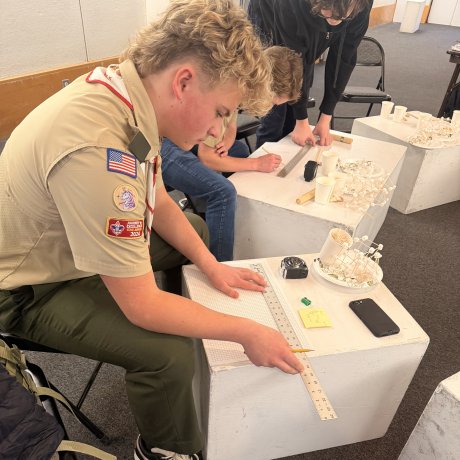
Scouting Day 2026 School of Architecture + Art Merit Badge
By Caroline Fraser '25, M'26
Local scouts take advantage of a day of learning alongside architecture students.
1 min read
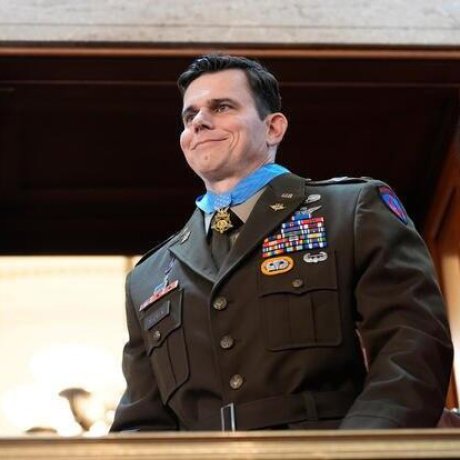
The Warrior Scholar: CW5 Eric Slover’s Medal of Honor Embodies the Norwich Spirit
By NU Marketing & Communications Office
A Norwich graduate receives the Medal of Honor during the State of the Union for his heroism — exemplifying the powerful combination of service and education in the citizen-soldier.
5 min read
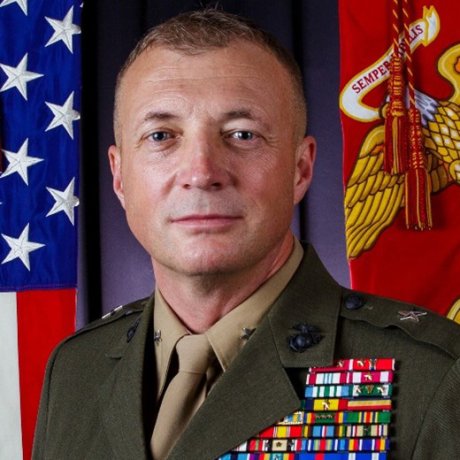
BGen Matthew Reid '93, USMC (Ret.), to return as Joint Commissioning speaker
By NU Marketing & Communications Office
A Class of 1993 alumnus will return to Norwich and address cadets at the Joint Commissioning Ceremony, bringing 32 years of Marine Corps leadership to the Class of 2026 as they enter military service.
5 min read

